 |
| |
MI6 trawls the archives to see how critics of
the day received Roger Moore's fourth outing as James
Bond in the 1979 film "Moonraker"...
|
|
Time Tunnel: Review Rewind
22nd April 2009
New York Times - June 29th,
1979
At a time when everything is being either inflated or devalued
it's comforting to know that at least one commodity maintains
its hard currency. That's James Bond, who, by all rights, should
be an antique, as emblematic of the sixties as the Beatles
and flower power, but who goes blithely on as if time has had
a stop.
Moonraker,
which opens today at the Rivoli and other theaters, is
the eleventh
in the remarkable series that began in 1963 (sic) with Dr.
No and it's one of the most buoyant
Bond films of all.
It
looks as if it cost an unconscionable amount of money
to make, though it has nothing on its mind except dizzying
entertainment, which is not something to dismiss quickly
in such a dreary, disappointing movie season. What's it about? That's a silly question, though I suppose
one might answer that it's about sleight of hands—those
of all the people who worked on it.
They include the indefatigable
producer, Albert
R. Broccoli (also known as Cubby); Lewis
Gilbert, who directed it; Christopher Wood, who wrote
the screenplay; Ken Adam, the production designer; and
all
of those far from little people who are responsible for
the extraordinary tricks that persuade us to suspend
our disbelief.
Mr. Wood's screenplay begins when a United States space-shuttle craft mysteriously disappears as it's being ferried to
England on the back of a Boeing 747. |
|
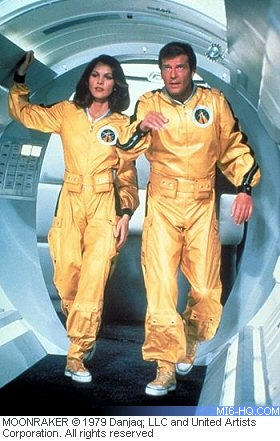 |
The fiend behind this
remarkable theft is a French-accented American aeronautics
tycoon named Drax (Michael Lonsdale), an eccentric fellow
who lives in California in a transplanted French château
and who surrounds himself with astronauts, all of whom
are between the ages of eighteen and twenty-five, beautiful,
and female.
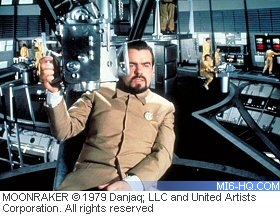
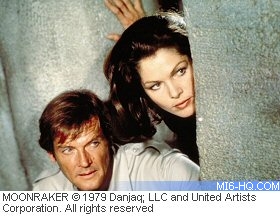
|
|
The space-shuttle craft,
called Moonraker, was actually built by Drax's company,
so the mystery that James
Bond (Roger Moore) must solve
is why Drax would feel the need to hijack his own product.
The trail leads from London to California to Venice to
Rio de Janeiro and, after that, to Drax's jungle hideaway
that takes in bits and pieces of settings filmed in Guatemala
and Argentina as well as Brazil. Among other things Moonraker
deals in creative geography. The climactic duel occurs
in the only location left—outer space.
Moonraker, like all of the better Bond pictures, returns
us to a kind of filmmaking that I most closely associate
with the fifteen-part serials of my youth. Our astonishment
depends on the ingenuity by which the writers and directors
disentangle Bond from the impossible situations into which
he seems to fall every seven minutes.
Moonraker begins with one of the funniest and most dangerous
(as well as most beautifully photographed and edited) sequences
Bond has ever faced. He's booted out of an airplane without
a parachute and must do mortal combat, during a swooping,
soaring free fall, with an adversary who, luckily, does
have a parachute. |
There are also a high-speed chase through Venetian
canals (with one gondola a disguised Hovercraft), another chase
on the Amazon, a fight on the roof of the funicular that goes
to the top of Rio's Sugar Loaf mountain, and a final confrontation
in space that is as handsome as anything in Star Wars. What's it
about? It's about movie-making of the kind Georges Méliès
pioneered in films like Voyage to the Moon (1902) and Twenty
Thousand Leagues under the
Sea (1907). It's the unimaginable most satisfactorily imagined.
Almost everyone connected with the movie is in top form, even
Mr. Moore, who has a tendency to facetiousness when left to his
own devices. Here he's as ageless, resourceful, and graceful
as the character he inhabits. Mr. Lonsdale is sometimes uncomfortably
wooden and square, but then he's not supposed to be a barrel
of laughs. Lois Chiles is lovely as Bond's Central Intelligence
Agency vis-à-vis, who's just one of the sexually tireless
Bond's conquests. Richard Kiel reappears as Bond's thug-enemy,
the gigantic Jaws, who, you may be happy to learn, undergoes
the kind of character transformation that means he'll probably
turn up in yet another Bond film. Bernard Lee and Lois Maxwell,
as, respectively, M and Miss
Moneypenny, also are on hand. Welcome
back to old friends.
Variety
- July, 1979
Christopher Wood's script takes the characters exactly where they always go in
a James Bond pic and the only question is whether the stunts and gadgets will
live up to expectations. They do.
The main problem this time is the outer-space setting
which somehow dilutes the mammoth monstrosity that 007
must save the world from. One more big mothership hovering
over earth becomes just another model intercut with elaborate
interiors.
The visual effects, stuntwork and other technical contributions
all work together expertly to make the most preposterous
notions believable.
And Roger Moore, though still compared
to Sean Connery, clearly has adapted the James Bond character
to himself and serves well as the wise-cracking, incredibly
daring and irresistible hero. |
|
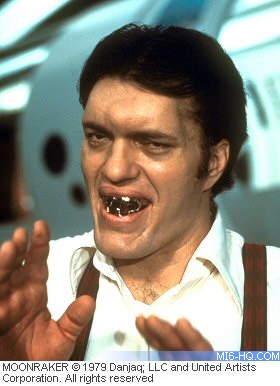
|
Time - Jul 2nd,
1979
Producer Albert R. Broccoli, the major-domo of the James Bond
movies, is the proverbial Jewish mother of cinema: he is not
about to let anyone go away hungry. In Moonraker, the eleventh
007 opus, Broccoli serves the audience a space-shuttle hijacking,
a jumbo-jet explosion and a protracted wrestling match between
two men who are falling from the sky without parachutes. All
this happens before the opening credits. From there, it's on
to gondola chases in Venice, funicular crashes in Rio and laser-gun
shootouts and lovemaking in deep space. Meanwhile, beautiful
women come and go, talking (ever so discreetly) about fellatio.
When Broccoli lays out a feast, he makes sure that there is at
least one course for every conceivable taste.
The result is a film that is irresistibly entertaining
as only truly mindless spectacle can be. Those who have held
out on Bond movies over 17 years may not be convinced by Moonraker,
but everyone else will be. With their rigid formulas and well-worn
gags, these films have transcended fashion.
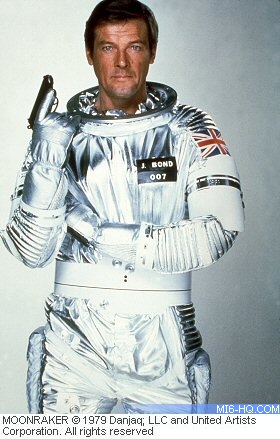
|
|
Styles in Pop culture,
sexual politics and international espionage have changed
drastically since Ian Fleming invented his superhero,
but the immaculately tailored, fun-loving British agent
remains
a jolly spokesman for the simple virtues of Western civilization.
Not even Margaret Thatcher would dare consider slowing
him down.
For Moonraker, screenwriter Christopher Wood has had
to do little more than dream up new settings, a new heroine
and a new villain with a novel dooms day plot. Everything
else takes care of itself. This time around, the bad
guy (Michael Lonsdale) is an aerospace conglomerateur
who plans to wipe out the world's population with deadly
Brazilian orchids before hatching a master race from
an interstellar sanctuary.
To stop him, Bond (the ever smooth Roger Moore) must team
up with Holly Goodhead (Lois Chiles), a CIA agent who picked
up her astronaut's training at NASA and her judo expertise
at Vassar. Such talents come in handy as the couple confront
traditional nemeses: an Oriental thug (Toshiro Suga), attack
dogs, and Jaws (Richard Kiel), the 7-ft. 2-in., steel-toothed
goon introduced in The Spy
Who Loved Me (1977) . |
Wood pulls off some witty flourishes. There
are funny references to other block buster movies (Close Encounters,
Superman, Sergio Leone westerns), as well as amusing bursts of
comic-book dialogue ("Look after Mr. Bond," whispers
the villain to an aide. "See that some harm comes to him").
Rather than stage variations on Jaws' old fiendish gags, Wood
has given the character some surprising twists, including a love
interest. As always, there is no explicit gore or sex to jolt
the audience back to reality.
If Moonraker is not quite as satisfying as Spy, the best of
the post-Sean Connery Bonds, the difference is in the casting.
Lonsdale is a bit too tame; he seems to be doing a John Ehrlichman
imitation. Chiles is all too sexless. The title song, the important
kickoff for Bond movies, is no match for Nobody Does It Better,
the Carly Simon dazzler of Spy.
Still, one does not tend to notice these failings as Moonraker
unfolds. Broccoli just keeps piling on the goodies: lush Ken
Adam sets, gadgetry and gams galore, super stunts and effects.
It may be another two-year wait for the next Bond film, so you
may as well just stuff yourself silly now .
Related Articles
 James Bond Time Tunnel
James Bond Time Tunnel
 Moonraker -
Movie Coverage
Moonraker -
Movie Coverage